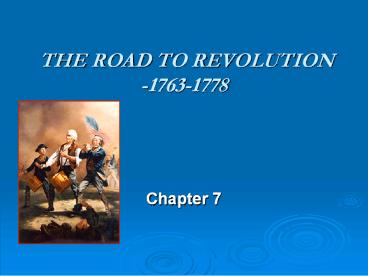THE ROAD TO REVOLUTION -1763-1778 - PowerPoint PPT Presentation
1 / 30
Title:
THE ROAD TO REVOLUTION -1763-1778
Description:
THE ROAD TO REVOLUTION -1763-1778 Chapter 7 THE DEEP ROOTS OF REVOLUTION American Revolution was a revolution in thought and perception about who the colonists were. – PowerPoint PPT presentation
Number of Views:214
Avg rating:3.0/5.0
Title: THE ROAD TO REVOLUTION -1763-1778
1
THE ROAD TO REVOLUTION -1763-1778
- Chapter 7
2
THE DEEP ROOTS OF REVOLUTION
- American Revolution was a revolution in thought
and perception about who the colonists were. - Reasons?
3
THE MERCANTILE THEORY
- Policy of all major European nations from 16th to
l8th centuries. - Mercantilism Belief that wealth was power and
that a countrys economic wealth (both military
and political power) could be measured by the
amount of gold or silver in its treasury.
4
MercantilismElements of the Theory
- To get gold, must export more than import
- Colonies provide export markets
- Colonies provide source for raw material
- Colonies cant trade with others
- Colonies cant produce their own finished goods
- Encourage colonies to produce what mother country
must import
5
Mercantilism Trammels On Trade
- Parliament passed many laws to enforce the
mercantile system - Navigation Laws most famous
- Significance
6
The Money Problem
- All currency came from outside.
- Had to use British, French and Spanish Coins
- Colonists buying more than could sell under
Mercantile policies, so chronic shortage of hard
currency
7
The Money Problem
- What did colonists use for currency besides
coins? - Barter
- On the eve of revolution, colonies issue paper
money of dubious value - Why value dubious?
- Parliament eventually bans, which is one more
grievance of colonists
8
Merits of Mercantilism
- Salutary Neglect.
- Smuggling.
- Americans did reap many direct benefits from
Mercantilism. - What were they?
9
Benefits of Mercantilism
- Price supports and subsidies helped them compete
against the Europeans. - Tobacco monopoly.
- They had rights of Englishmen and opportunities
for self-government. - Protection of the strong British army and Navy
- Prosperity trickled down
10
The Menace Of Mercantilism
- Downside to Mercantilism
- It hurt economic initiative
- Southern planters were treated more favorably.
- Cash Crop farmers forced into debt
- Mercantilism was humiliating to Americans
11
The Stamp Tax Uproar
- After the war, Brits wanted to start taxing the
American Colonies. - Why?
- For what Purpose?
- George Grenville ordered End of Salutary Neglect.
- Revenue Acts
12
New Mercantilist Laws
- Sugar Act1764
- Quartering Act of 1765
- Stamp Act 1765
- This Act became the most hated
13
Stamp Act
- What it required
- Who it antagonized
- British view of its fairness
- American view of its fairness
- No taxation without representation
- Virtual representation
14
Parliament Forced To Repeal The Stamp Act
- Stamp Act Congress of 1765
- Non-importation agreements of British goods
- Sons of Liberty and Daughters of Liberty
- Declaratory Act
Tarring and Feathering a Tax Stamp Agent
15
The Townshend Tea Tax And The Boston Massacre
- Charles Champagne Charlie Townsend emerges as
PM - In 1767 he persuades Parliament to pass the
Townshend Acts - Colonists object
- 1768 British officials landed 2 regiments of
troops (700) in Boston
16
Boston Massacre
17
The Seditious Committees Of Correspondence
- Townshend Acts were a failure
- In 1770 Townshend Acts repealed. But the tax on
tea remained - Sam Adams, master propagandist
- Organized the local Committees of Correspondence
in Mass - Led to Inter-colonial committees of
correspondence
Sam Adams
18
Boston Tea Party
- 1773 the British East India Company had a big
problem - What was it?
- How did Parliament try to remedy it?
- Why was Parliament so motivated to fix the
problem?
19
Tea Act 1773
- Britain gave BEIC a complete monopoly on the
American tea business. - Consequences
- Able to sell tea more cheaply than the smuggled
tea, even with the tax. - Cuts out the American middle-man
- Angers colonists. Americans see as a trick to
make the tax palatable.
20
Boston Tea Party
- None of the tea cargo of the Company reached its
destination. - Annapolis colonists burned cargo and the ships.
- CharlestonGovernor stores in a warehouse. Is
eventually sold during the war to pay for
uniforms. - Boston band of white townspeople dressed as
Indians boarded the 3 tea ships on Dec. 6, 1773.
They smashed 342 chests and dumped the tea into
Boston harbor. Boston Tea party
21
Boston Tea Party
22
Response to Boston Tea Party
- Reactions of public
- Reaction of Parliament
- Intolerable Acts
- Boston Port Act
- Mass. Government Act
- Quartering Act
- Admin. of Justice Act
23
Quebec Act - 1774
- Not part of the Intolerable Acts. But passed at
the same time. - What did it say?
- Colonists believed it was intolerable and
designed to punish them. - Why?
24
Quebec Before and After 1774
25
The Continental Congress And Bloodshed
- 1774--In response to the Intolerable Acts
colonists call First Continental Congress - Met in Philadelphia to discus ways of redressing
colonial grievances. - 12 of 13 colonies sent 55 men
- Drew up a Declaration of Rights
26
The Continental Congress And Bloodshed
- Continental Congress helped create the
Association. - Attempt to get Brits to repeal the Intolerable
Acts and taxes. - What was it?
- Called for a complete boycott of British goods.
non-import, non-export and non-consumption. - Was a move toward unity.
27
Lexington and Concord
- Sam Adams
- John Hancock
- Paul Revere
- Shot Heard Round the World
28
Lexington
29
Strengths and Weaknesses
- British Strengths
- British Weaknesses
- American Strengths
- American Weaknesses
30
A THIN LINE OF HEROES































